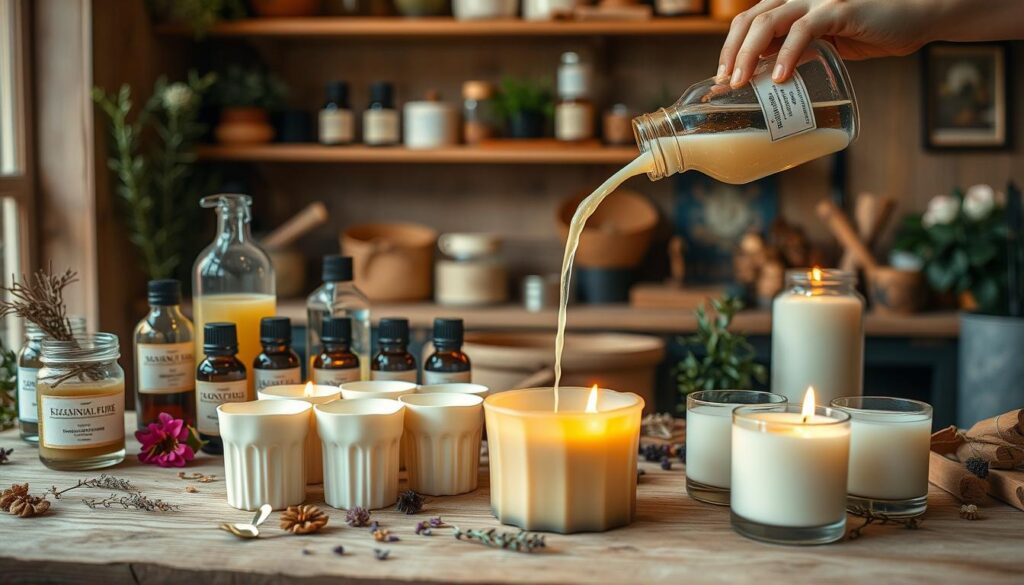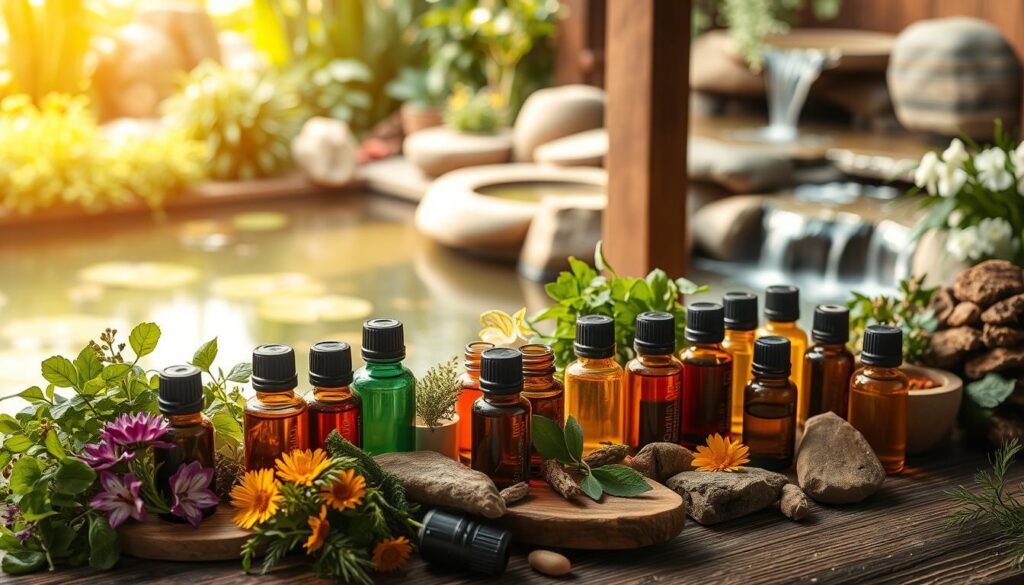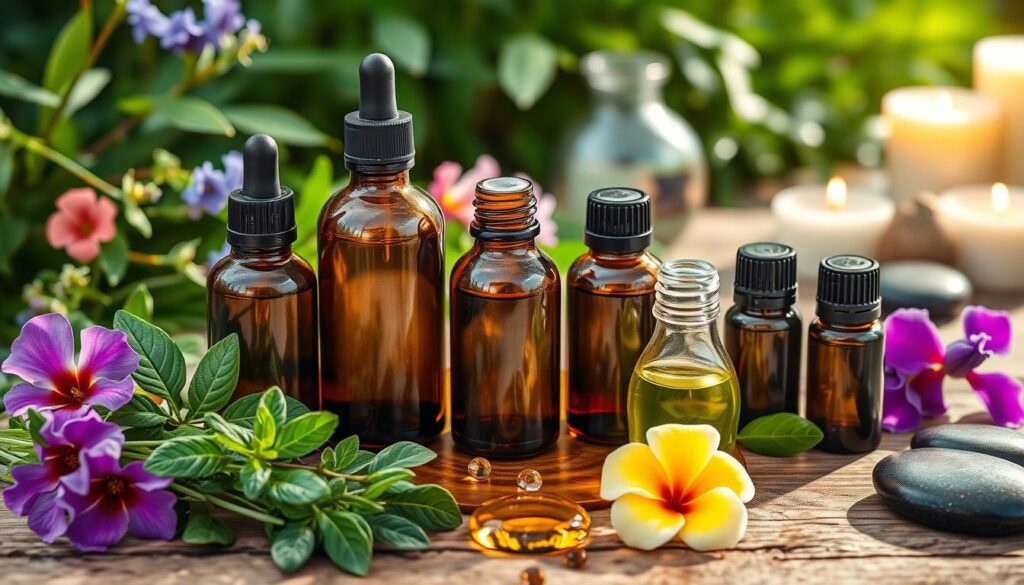Did you know essential oils are now a huge industry? The global market size was USD 18.6 billion in 2020. It’s expected to grow at 7.4% each year until 2028. These oils are not just popular; they’re key to many people’s health routines.
I’m all about alternative medicine and holistic wellness. Essential oils are amazing for mental clarity and easing pain. They’ve been valued for centuries, and their benefits are timeless.
In these pages, you’ll learn about essential oils’ incredible power. We’ll cover how they’re made, their history, and their health benefits. This guide is for both newcomers and those looking to learn more. You’ll get useful tips on using essential oils every day.
Key Takeaways
- Essential oils are a booming business with a USD 18.6 billion valuation in 2020.
- These oils offer a myriad of benefits for physical, mental, and emotional health.
- Essential oils are rooted in ancient practices but are incredibly relevant today.
- This guide aims to educate on the diverse uses and benefits of essential oils.
- You’ll discover how to incorporate these natural remedies into your holistic wellness journey.
Introduction to Essential Oils
Essential oils are known for their strong fragrances and health benefits. They come from plants and are very concentrated. People have valued them for centuries, using them for health and cultural reasons.
What Are Essential Oils?
Essential oils are strong extracts from plants like leaves and flowers. They are famous for their health benefits. For example, peppermint oil helps fight tiredness and boosts mood.
Tea tree oil is good for fighting germs. Lavender oil helps with stress, pain, and sleep. Each oil has its own special mix of scents and plant extracts.
The History of Essential Oils
Essential oils have been important for thousands of years. In ancient Egypt, they were used in rituals and daily life. The Greeks and Romans also used them for health and wellness.
Today, essential oils are popular again. They are used worldwide for their health benefits and fragrances.
How Essential Oils Are Made
Essential oils are made carefully to keep them pure and strong. There are a few main ways to extract them:
- Distillation: This method uses steam to get the oil from plants. It’s good for oils like eucalyptus, which helps with colds.
- Cold Pressing: This is used for citrus oils like lemon. It presses the oil out without heat, keeping the scent and health benefits.
These methods help keep the essential oils strong and useful. They are used in many ways, like in wellness, skincare, and aromatherapy.
Benefits of Using Essential Oils
Essential oils offer many benefits for your health and happiness. They help with natural healing and support your wellness journey.
Physical Health Benefits
Essential oils can help with physical problems. For example, lavender and bergamot oils can lower anxiety and pain. Lemon balm oil, made from 5,000 pounds of petals, boosts brain function in Alzheimer’s patients.
These oils are a natural way to heal. Lemongrass oil can lower blood sugar in type 2 diabetes patients. Tea tree and eucalyptus oils fight off athlete’s foot and oral thrush. But, be careful not to apply them directly to your skin or eat them, as they can cause problems.
Mental Health Benefits
Essential oils are great for your mind. They can make you more focused and less stressed. For example, orange oil made male volunteers feel less anxious.
Lavender oil is also good for your mind. It helps older adults sleep better when used on their pillows. This shows how essential oils are key to a healthy life.
Emotional Well-being
Essential oils also help with your emotions. They can make you feel better and more balanced. Lemon oil, for instance, improves mood and brain function with its fresh scent.
But, it’s important to use them right to avoid side effects like rashes or hormonal issues. Despite these risks, essential oils are a great addition to your wellness journey. They offer natural ways to improve your overall well-being.
How to Use Essential Oils for Aromatherapy
Aromatherapy uses essential oils to improve physical, mental, and emotional health. It includes methods like essential oil diffusion, topical application, and inhalation therapy. Let’s explore these methods to understand how to use essential oils effectively.
Diffusing Essential Oils
Diffusing essential oils is a popular way to enjoy their benefits. It spreads the oils into the air, making a space feel relaxing and focused. A diffuser can turn your home into a peaceful place that supports your well-being.
When using a diffuser, follow the manufacturer’s instructions. This prevents strong scents or harmful effects. Lavender for calm, peppermint for focus, and citrus for energy are good choices. Clean your diffuser often to keep it working well.
Topical Application
Applying essential oils to the skin is another effective method. It involves mixing diluted oils with carrier oils like coconut or jojoba. This helps avoid skin irritation.
Topical application is great for muscle pain, skin issues, and relaxation. For example, tea tree oil is good for cuts and acne. Always test a small area first to check if your skin reacts well.
Inhalation Techniques
Inhalation therapy is a direct way to use essential oils. You can inhale from the bottle, use steam, or put oil on a handkerchief. It’s fast and effective for cold symptoms, stress, and breathing problems.
Steam inhalation is a favorite method. It involves adding oil to hot water and breathing in the vapor. It’s great for breathing issues. Eucalyptus and peppermint are good for this because they clear the airways.
Choosing the right method is important for safe use of essential oils. By using diffusion, topical application, and inhalation, you can make your space aromatic and supportive of your health.
Top Essential Oils for Sleep
Getting a good night’s sleep can be tough. But, nature has a solution in aromatherapy for sleep. Here, I’ll share the best essential oils for relaxation and sleep.
Lavender Oil
Lavender oil is famous for its calming effects. It’s a top choice for those who want to relax. Studies have shown its benefits:
- A study with 159 new moms found lavender aromatherapy improved their sleep over eight weeks.
- Another study in an intensive care unit showed lavender oil improved sleep and reduced anxiety in heart disease patients after 15 days.
- Lavender oil has also helped improve sleep in people with insomnia, students, and postpartum mothers.
Lavender oil is versatile. You can diffuse it in a room or add it to a relaxing bath. Its calming scent is great for both mind and body.
Chamomile Oil
Chamomile oil, like Roman chamomile, is great for better sleep. It has a mild, floral scent that relaxes. Research shows:
- A blend of Roman chamomile, lavender, and neroli improved sleep and reduced anxiety in ICU patients.
- Inhalation of chamomile and lavender essential oils lowered anxiety in nurses and pregnant women.
Using chamomile oil in your evening routine can make your sleep space calm and peaceful.
Vetiver Oil
Vetiver oil is less known but powerful for relaxation. Its earthy scent grounds and calms. Though studies are limited, its sedative effects are well-known in aromatherapy.
To use vetiver oil, add a few drops to a diffuser or mix with a carrier oil. Jojoba and sweet almond oil are good choices. This can enhance your evening routine, preparing you for rest.
These calming essential oils are a natural way to solve sleep problems. With over a third of Americans not getting enough sleep, using these oils could greatly improve your well-being.
| Essential Oil | Properties | Uses | Study Outcomes |
|---|---|---|---|
| Lavender Oil | Calming, relaxing | Diffusing, baths | Improved sleep quality, reduced anxiety |
| Chamomile Oil | Soothing, anti-anxiety | Diffusing, topical application | Reduced anxiety, improved sleep quality |
| Vetiver Oil | Sedative, grounding | Diffusing, topical application | Natural sedative effects, used in aromatherapy practices |
The Best Essential Oils for Sunburn Relief
Dealing with a sunburn can be really uncomfortable. But, there are natural ways to help. Essential oils, with their healing properties, can soothe sunburned skin. Peppermint, eucalyptus, chamomile, and tea tree oil are good choices.
It’s key to use these oils carefully. Mix them with carrier oils before applying to your skin. This makes sure they work well and are safe.
Here’s a comparison of select essential oils:
| Essential Oil | Properties | Potential Risks |
|---|---|---|
| Peppermint | Anti-inflammatory, Antibacterial, Antifungal, Antiseptic, Vasoconstrictor | Can cause irritation on inflamed skin |
| Eucalyptus | Antioxidant, Anti-inflammatory, Antibacterial | Allergic rash, Drowsiness, Breathing difficulty |
| Chamomile | Anti-inflammatory, Wound healing | Rare full-body allergic response |
| Tea Tree | Anti-inflammatory, Antibacterial, Antifungal | Rare serious complications like dry skin, Stomach pain |
Essential oils need to be used with caution. People with sensitive skin, kids, and pregnant women should talk to a doctor first. Experts say to use simple moisturizers and cool gels instead. Always apply essential oils to fully healed skin to avoid making sunburn worse.
In short, while some oils can help with sunburn, safety comes first. Always dilute them, watch for any bad reactions, and choose safer options if needed.
Incorporating Essential Oils in Candle Making
Adding essential oils to candle making turns a simple project into a sensory delight. To get the best results, pick the right oils, mix them creatively, and follow safety tips. Let’s explore the key steps in this fragrant journey.

Choosing the Right Oils
Choosing the right essential oils is key for candle making. Choose high-quality oils from trusted sources like Gypsy Rose Holistic or N-Essentials. Oils like lavender, grapefruit, and cinnamon can make any room smell amazing.
When using soy wax, add essential oils between 85°C and 90°C (185°F and 195°F). This temperature helps the fragrance spread well without harming the wax.
Blending Oils for Unique Scents
Mixing essential oils can make your candles truly unique. Try blends like lavender and grapefruit, lemon and rosemary, or cinnamon and clove. Start with 10-15 drops per 1 cup of wax and adjust to taste.
Diluting oils with jojoba or coconut oil can make scents stronger and prevent smoking.
Safety Tips for Candle Making
Always prioritize safety when making candles. Follow these tips for a safe and fun crafting session:
- Avoid adding essential oils directly to a burning candle to prevent flame disruption and possible hazards.
- Add essential oils only during the candle-making process, not after.
- Use pure, natural essential oils in small amounts to avoid overpowering scents and excessive smoking.
- Keep the wax temperature between 49°C and 54°C to keep the fragrance.
- Let the wax cure for at least 24 hours or up to 3-5 days before lighting the candle.
| Essential Oils | Ideal Temperature | Scent Combinations |
|---|---|---|
| Lavender | 85°C – 90°C (185°F – 195°F) | Lavender & Grapefruit |
| Lemon | 49°C – 54°C (120°F – 130°F) | Lemon & Rosemary |
| Cinnamon | 85°C – 90°C (185°F – 195°F) | Cinnamon & Clove |
Using essential oil blends in candle making not only improves your craft but also adds a unique DIY scent to your home. It’s a rewarding journey that combines creativity with the healing power of natural fragrances.
Essential Oils for Pet Care: Cats and Dogs
Adding essential oils to pet care can really help cats and dogs. But, we must pick safe essential oils for pets and use them right. With the right info, you can use aromatherapy for pets safely and keep them healthy.
Safe Oils for Dogs
When using aromatherapy for pets, dogs need special care. Dogs can handle diluted essential oils well. Mix four to five drops of essential oils with 10 mL of carrier oil. Dogs have a strong sense of smell, so a little goes a long way.
Some safe essential oils for pets include:
- Lavender: It calms dogs and helps with stress.
- Chamomile: Good for soothing skin and relaxing dogs.
- Bergamot: Helps with anxiety and lifts mood.
But, tea tree oil is very dangerous for dogs. It can harm their nervous system and even be fatal in small amounts.
Safe Oils for Cats
Cats need extra care because of their special metabolism. Safe essential oils for cats can help them feel better.
Good oils for cats include:
- Turmeric: Supports joint health and reduces inflammation.
- Cedarwood: Repels pests and soothes the skin.
- Frankincense: Calms and heals.
- Lavender: Safe in a water diffuser, it relaxes cats.
Stay away from oils like tea tree and rosemary. They are toxic to cats and can cause serious reactions.
How to Use Essential Oils Safely Around Pets
Using essential oils correctly is key to keeping pets safe. Always dilute them before use. Signs of oil poisoning in pets include panting, drooling, and trouble breathing. If your pet shows any bad reactions, get vet help right away.
Here are some tips:
- Diffusion: Using a water diffuser is safe. It spreads the oils slowly and in small amounts.
- Topical Application: Put diluted oils on specific spots, but avoid the nose, eyes, and mouth.
- Vet Consultation: Always talk to a vet before adding essential oils to your pet’s routine. Vets like Dr. Mary Hess suggest having an essential oil kit for pets to help with stress, parasites, and pain.
Brands like Young Living have essential oil blends for pets. They help with health issues safely and naturally.
| Safe Essential Oils | For Dogs | For Cats |
|---|---|---|
| Lavender | ✅ | ✅ (in diffuser) |
| Chamomile | ✅ | ❌ |
| Bergamot | ✅ | ❌ |
| Turmeric | ❌ | ✅ |
| Cedarwood | ❌ | ✅ |
| Frankincense | ✅ | ✅ |
Combating Ear Infections with Essential Oils
Essential oils are gaining popularity for natural ear care. Ear infections often get better on their own in a week or two. But, people use essential oils to help with pain and swelling.
Tea tree oil is known for its terpinen-4-ol, which fights bacteria well. A 2006 review showed it’s better at killing bacteria than some cleaners. But, always mix it with a carrier oil to avoid skin problems.
Basil oil is also good, thanks to its antibacterial compounds. A 2005 study found it helped rats with ear infections a lot.
Using essential oils for ear care needs care. Here’s how to do it right:
- Always mix essential oils with a carrier oil first. Use one drop of essential oil to one teaspoon of carrier oil.
- Do a skin test before using it. Put a small amount on your skin and wait 24 hours.
- Only use one to two drops to avoid clogging your ears. Too much can cause problems.
- Don’t use essential oils if you have a damaged eardrum or ear surgeries.
- Keep essential oils away from kids to avoid accidents.
Even though essential oils aren’t FDA-approved for ear infections, many use them. Always talk to a doctor before trying them.
Research on essential oils for ear infections is ongoing. A 2019 study showed garlic derivatives might help fight ear infection bacteria. Some studies also suggest essential oils could work as well as antibiotic drops.
Here’s a table comparing popular essential oils and their benefits:
| Essential Oil | Key Component | Properties |
|---|---|---|
| Tea Tree Oil | Terpinen-4-ol | Antibacterial, Anti-inflammatory |
| Basil Oil | Methyl Eugenol, Methyl Chavicol | Antibacterial, Analgesic |
| Garlic Oil | Allicin, S-allyl Cysteine | Antimicrobial |
Essential oils show promise for ear health, but use them carefully. Make sure you know how to use them safely and what side effects to watch out for.
Essential Oils for Holistic Wellness
Embracing holistic wellness means looking at mind, body, and spirit. Essential oils are key in this, used in aromatherapy, massage, and baths. They help people use natural remedies to stay healthy.
Aromatherapy
Aromatherapy has been around for thousands of years. Ancient cultures like the Egyptians, Greeks, and Romans used essential oils for health. Oils like Lavender, Clary Sage, and Eucalyptus help with stress and mood.

Massage Therapy
Massage with essential oils is great for relaxation and blood flow. Blends like BALANCE™, CALM™, and MUSCLE SOOTHE™ use oils like Cedarwood, Ginger, and Juniper. They offer specific benefits.
For example, Cedarwood helps with stress, which is good for those with busy lives.
Bathing Solutions
Essential oils in baths make for a relaxing treat. Blends like REVIVE™, PURIFY™, and SLEEP™ are made for this. They have oils like Chamomile and Lavender for calmness, and Eucalyptus and Arnica for muscle relief.
Adding these to your bath can help your body and mind.
There are kits like UNWIND, UPLIFT, and IMMUNE KICK for different wellness needs. Holistic health is more than a trend; it’s a lifelong commitment to natural healing.
Creating a Relaxing Atmosphere with Essential Oils and Humidifiers
Using essential oils with humidifiers can make any space feel calm and moist. It’s important to know the benefits, pick the right oils, and keep the humidifier in good shape. This helps improve the air and feel of your home or office.
Benefits of Using Humidifiers
A humidifier adds moisture to the air, making it easier to breathe. It can also carry essential oils, making the air even more relaxing. Ultrasonic humidifiers are great because they release tiny mist particles. They use very little power, just 8 watts.
Best Essential Oils for Humidifiers
Choosing the right essential oils is key for your humidifier.
- Lavender Essential Oil: It helps calm you down, relieves anxiety, and improves sleep.
- Lemon Essential Oil: It boosts your mood and helps with nausea.
- Peppermint Essential Oil: It eases stomach pain, IBS, and cold symptoms.
- Eucalyptus Essential Oil: It’s a decongestant, helps with breathing and muscle soreness.
- Orange Essential Oil: It lifts your mood, reduces stress, and helps you sleep better.
Start with 5-10 drops of essential oils per 100ml of water in the diffuser. Adjust based on how you like it. Always follow the manufacturer’s instructions for the best results and essential oil safety.
Maintaining Your Humidifier
Keeping your humidifier in good shape is important. Don’t put essential oils in traditional humidifiers as they can damage them. Ultrasonic humidifiers are safe for essential oils and won’t harm the unit. Clean your humidifier as directed by the manufacturer to keep it working well and ensure essential oil safety.
Understanding the Science Behind Essential Oils
Essential oils have gained a lot of attention for their healing properties. They work by interacting with our body’s systems through volatile compounds. Let’s explore the science behind these oils.
Volatile Compounds and Plant Extracts
Volatile compounds are key in essential oils, giving them smell and healing powers. These small molecules can easily mix with our bodies. Essential oils come from different parts of plants, like leaves and roots. It takes a lot of plant material to make just one bottle of oil.
This process makes essential oils very strong. Their concentrated form is what makes them effective.
Therapeutic Properties
Studies have shown that essential oils have many benefits. Citrus oils, for example, can fight bacteria and reduce inflammation. Lavender and tea tree oils might affect hormones, leading to breast growth in young people.
But, oils like lemon and peppermint could help with dementia and irritable bowel syndrome. These findings are promising.
Scientific Studies and Evidence
More research is needed to prove the benefits of essential oils. Some studies have shown positive results, like fighting Lyme bacteria better than antibiotics. But, other benefits, like mood improvement, are not clear.
Essential oils can help with hair loss, but they might also cause abnormal breast growth. This shows we need more research to understand their effects.
| Essential Oil | Therapeutic Use | Scientific Evidence |
|---|---|---|
| Lavender Oil | Relaxation, Stress Relief | Mixed Results |
| Tea Tree Oil | Acne Treatment | Effective |
| Lemon Oil | Mood Boost, Cleaning | Inconclusive for Mood Boost |
| Citrus Oils | Antibacterial, Anti-inflammatory | Effective |
| Bergamot Oil | Fight Food Poisoning | Effective |
| Peppermint Oil | Alleviate IBS Symptoms | Effective |
Conclusion
Essential oils have become a key part of *natural healing* practices. They have been used for centuries and are now widely recognized. Studies and personal stories show their power to improve health.
These oils are great for many health issues and daily wellness. Lavender oil helps with sleep, and they fight off germs. They also help with digestion and have antioxidant effects.
Using essential oils can help you on your *natural healing journey*. They are powerful when used safely. You can use them in many ways, like in aromatherapy or making candles. Remember, finding holistic health is a personal and ongoing journey.
FAQ
What are essential oils?
Essential oils are strong, fragrant compounds from plants. They have natural healing powers. People use them for wellness.
How are essential oils made?
Essential oils come from plants through distillation or cold pressing. These methods get the plant’s healing and scent.
What is the history of essential oils?
Essential oils have been around for thousands of years. They were used in ancient rituals and medicine. They’re a key part of natural healing.
What are the physical health benefits of using essential oils?
Essential oils can help with pain and boost the immune system. They offer a natural way to help with health issues.
How do essential oils benefit mental health?
Essential oils can lower stress and improve mood. Their scents create a calm space for mental health.
What are the emotional benefits of essential oils?
Essential oils can lift mood and reduce stress. They affect emotions by reaching the limbic system. This supports emotional balance.
How can essential oils be used for aromatherapy?
You can diffuse essential oils in the air, apply them to skin, or inhale them. Each way helps create a calming space.
Which essential oils are best for sleep?
Lavender, Chamomile, and Vetiver oils are great for sleep. They calm and help relax, making them perfect for bedtime.
How can essential oils help with sunburn relief?
Some essential oils can heal sunburned skin and ease pain. They’re a natural way to soothe sunburn.
How can I incorporate essential oils in candle making?
Essential oils add natural scents to candles. Choose the right oils for their smell and stability. Follow safety tips to make safe, fragrant candles.
Are essential oils safe for pets?
Some essential oils are safe for pets, but be careful. Always check if they’re okay for cats and dogs. Using them safely keeps pets healthy.
Can essential oils help with ear infections?
Certain essential oils have antibacterial properties. They can fight ear infections. But, use them wisely and safely for best results.
How can essential oils be used for holistic wellness?
Essential oils are used in many ways for wellness. They’re used in aromatherapy, massage, and baths. They help with both mind and body health.
What are the benefits of using essential oils with humidifiers?
Using essential oils with humidifiers makes the air soft and moist. It improves air quality and brings relaxation to any room.
What is the science behind essential oils?
Essential oils have compounds that work with the body for health benefits. Science is studying their effects to learn more about their healing powers.
Source Links
- https://www.abebooks.com/9781925924572/Essential-Oils-Aromatherapy-Guide-Ayurvedic-1925924572/plp – Essential Oils: Your Aromatherapy Guide to Ayurvedic Healing – Ratan, Dr Ravi: 9781925924572
- https://www.goodreads.com/shelf/show/essential-oil – Essential Oil Books
- https://www.charlottesweb.com/pages/complete-introduction-to-essential-oils – A COMPLETE INTRODUCTION TO ESSENTIAL OILS
- https://mlovesm.com/2017/02/introduction-to-essential-oils/ – An Introduction to Essential Oils – M Loves M
- https://health.clevelandclinic.org/essential-oils-101-do-they-work-how-do-you-use-them – 11 Essential Oils: Their Benefits and How To Use Them
- https://www.webmd.com/diet/health-benefits-essential-oils – Health Benefits of Essential Oils
- https://www.healthline.com/health/how-to-use-essential-oils – How to Use Essential Oils with a Diffuser, on the Skin, in Bath, More
- https://www.webmd.com/skin-problems-and-treatments/ss/slideshow-essential-oils – Dos and Don’ts of Essential Oils
- https://www.verywellhealth.com/aromatherapy-for-sleep-89673 – Which Essential Oils Can Help You Sleep Better?
- https://www.sleepfoundation.org/sleep-aids/best-essential-oils-for-sleep – The Best Essential Oils for Sleep
- https://www.healthline.com/health/essential-oils-for-sunburn – Essential Oils for Sunburn: Benefits, Uses, and Risks
- https://www.usdermatologypartners.com/press-media/can-you-put-essentials-oils-on-a-sunburn/ – Can You Put Essentials Oils on a Sunburn? We Asked Dermatologists
- https://www.medicalnewstoday.com/articles/319745 – 8 essential oils for sunburn
- https://gypsyroseholistic.com/blogs/journal/when-to-add-essential-oil-to-candles-a-guide-to-perfect-fragrance-fusion?srsltid=AfmBOoqDZb3OqFcb2nWwpAsoAOGuCZJxVSMCSW17K6LFMfox2fTAConR – When to Add Essential Oil to Candles: A Guide to Perfect Fragrance Fusion
- https://n-essentials.com.au/blog/tips-for-candlemaking-with-essential-oils/?srsltid=AfmBOoqA3miF075Yad03HUEIKCv6oApdfIBNoTaW8pRnF7Hh3iBjwPkS – Tips for candle-making with essential oils
- https://www.edensgarden.com/blogs/news/can-you-use-essential-oils-for-candle-making?srsltid=AfmBOorUOspng6lP8gXmHzI7KXH8pIgrzV3khq09BrrIlisi9_lKkcQT – Can You Use Essential Oils For Candle Making?
- https://www.forbes.com/advisor/pet-insurance/pet-care/essential-oils-for-cats-and-dogs/ – Pet Safe Essential Oils For Cats And Dogs
- https://www.purrfurredpet.com/essential-oils/ – Essential Oils for Pets – A Purrfurred Pet Care Service
- https://www.healthline.com/health/essential-oils-for-ear-infection – Essential Oils for Ear Infection: Know the Facts
- https://www.verywellhealth.com/essential-oils-for-ear-infection-5184023 – Can Essential Oils Help With an Ear Infection?
- https://www.livingearthcrafts.com/holistic-alchemy-organic-essential-oil-kits.html – Holistic Alchemy™ Organic Essential Oil Kits
- https://www.earthlite.com/holistic-alchemy-essential-oils-blends.html – Holistic Alchemy™ Essential Oils – Blends
- https://volantaroma.com/blogs/guides/essential-oils-for-holistic-health – Holistic health: How essential oils can heal your body, mind & soul
- https://www.airoasis.com/products/oil-diffuser?srsltid=AfmBOoqQafdYHpiDs-NQ0UBZ-cp_648SUJfZSU_AZTURPxW6a1zcjF-u – Essential Oil Diffuser & Humidifier
- https://nikura.com/blogs/living-well/can-you-put-essential-oils-in-a-humidifier?srsltid=AfmBOopt0MIHvK7p0P7Sq8CHp0lkc2Hc1Ysyv6trTBY7R_ornK6Fqnie – Can You Put Essential Oils in a Humidifier?
- https://asakuki.com/blogs/news/how-to-create-a-relaxing-atmosphere-with-asakuki-diffuser – How to Create a Relaxing Atmosphere with ASAKUKI Diffuser?
- https://www.scientificamerican.com/article/do-essential-oils-work-heres-what-science-says/ – Do Essential Oils Work? Here’s What Science Says
- https://www.niehs.nih.gov/health/topics/agents/essential-oils – Essential Oils
- https://www.hopkinsmedicine.org/health/wellness-and-prevention/aromatherapy-do-essential-oils-really-work – Aromatherapy: Do Essential Oils Really Work?
- https://www.ncbi.nlm.nih.gov/pmc/articles/PMC10905622/ – Essential oils: a systematic review on revolutionizing health, nutrition, and omics for optimal well-being
- https://www.ncbi.nlm.nih.gov/books/NBK551018/ – Summary and Discussion – Aromatherapy and Essential Oils: A Map of the Evidence
- https://www.intechopen.com/chapters/68027 – Biological Importance of Essential Oils



